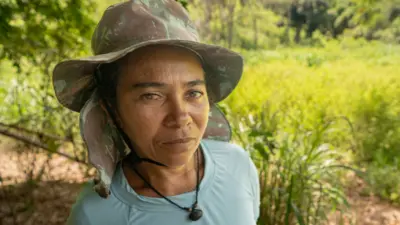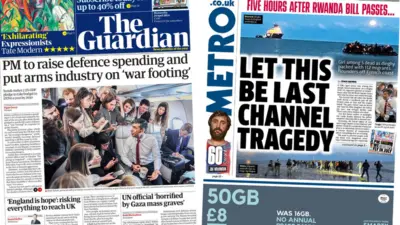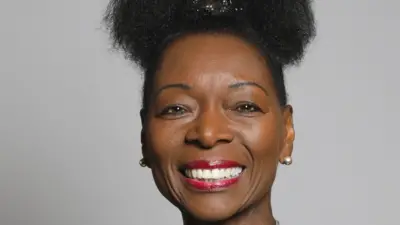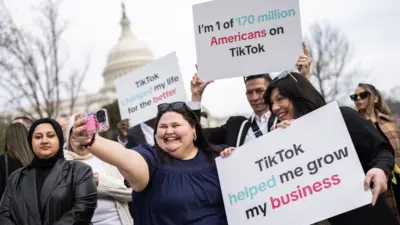We've updated our Privacy and Cookies Policy
We've made some important changes to our Privacy and Cookies Policy and we want you to know what this means for you and your data.
Foreign aid: UK cuts its pledge to UN family planning by 85%
Image source, Sheena Ariyapala/DFID/FLICKR
The UK government has been accused of going back on its promises by cutting 85% of aid funding pledged to the United Nations global family planning programme.
The UN Population Fund says the UK had pledged £154m for its projects but now says it will get around £23m this year.
Advocates for family planning say it improves the rights of women and girls around the world.
The government said Covid meant tough but necessary decisions were needed.
A spokesperson for the Foreign and Commonwealth Development Office (FCDO) said temporary reductions in aid spending were vital as the pandemic had badly affected public finances.
The government announced last year it would cut UK aid spending from 0.7% of national income to 0.5% - which amounts to a reduction of more than £4bn. It has yet to confirm which programmes will be affected.
Some MPs defended the cuts at the time as being backed by the public, with some politicians arguing that domestic spending should come first during the pandemic.
Family planning includes the provision of contraceptives and maternal health care for millions of women in some of the world's poorest countries.
The UN Population Fund - known as UNFPA - said the UK decision would be "devastating for women and girls and their families across the world".
UNFPA executive director Dr Natalia Kanem said it "deeply regrets the decision of our longstanding partner and advocate to step away from its commitments at a time when inequalities are deepening and international solidarity is needed more than ever".
She estimated the £130m lost would have helped prevent about 250,000 maternal and child deaths, 14.6 million unintended pregnancies and 4.3 million unsafe abortions.
MSI Reproductive Choices, an organisation that provides contraception and safe abortion services around the world, is set to be affected by the cuts. In 2020 it received an estimated $8.5m (£6m) worth of commodities from the UNFPA.
"Over the last 10 years, we have seen the difference that the UK's leadership on this issue has made to millions of women around the world. The cuts will do untold harm to the progress made on preventing women dying from pregnancy related causes and jeopardise the government's commitments on girls' education and increasing resilience to the climate crisis," CEO Simon Cooke said.
Bekky Ashmore, an adviser with the charity Plan International UK, said the cuts would "devastate the lives of so many women and girls, often in the poorest and most marginalised communities around the world".
Manuelle Hurwitz, from the International Planned Parenthood Federation, said the cuts were "shameful".
"Globally, 217 million women want to avoid pregnancy but do not have access to modern contraceptives. With the funding withdrawal, this number will undoubtedly increase," she said, adding that the cuts would also force more girls out of school and contribute to an increase in maternal deaths and unsafe abortions.
'Basic right'
Ministers have previously said the UK was "world-leading" and "at the forefront of global efforts to promote sexual and reproductive health and rights for women and girls living in the world's poorest countries".
The former Department for International Development - which became part of an enlarged Foreign Office last year - described family planning projects as helping to break the "cycle of poverty" for many women.
Announcing a five-year funding plan worth £600m in 2019, former International Development Secretary Alok Sharma said the package would "help give millions of women and girls control over their bodies, so they can choose if, when and how many children they want".
"That is a basic right that every woman and girl deserves," he said.
Image source, Sheena Ariyapala/DFID/FLICKR
Former international development minister Baroness Sugg, who resigned last year over the aid cuts, told the BBC that reducing support for family planning would "mean that women in 40 of the world's poorest countries will not have access to the voluntary contraception that will prevent millions of unintended pregnancies and unsafe abortions".
Tory MP Caroline Nokes, who chairs the Women's and Equalities select committee, said the cuts were "really regressive" and "a big mistake".
She told the BBC News Channel the UK needed to maintain its commitment to the poorest and "shouldn't be balancing our books on their backs", adding that MPs did not get to vote on the changes to the aid budget.
The Labour MP Sarah Champion, who chairs the International Development select committee, said she was "appalled and ashamed", describing the decision as "incredibly short sighted".
An FCDO spokesperson said: "The UK is a world leader on international development. In 2020 we were the third biggest aid donor globally, spending £14.5bn.
"The seismic impact of the pandemic on the UK economy has forced us to take tough but necessary decisions, including temporarily reducing the overall amount we spend on aid. We will still spend more than £10bn this year to fight poverty, tackle climate change and improve global health.
"We are working through what this means for individual programmes. Decisions will be announced in due course."
Asked about the cuts, the prime minister said the government had always been clear that it intended to return to spending 0.7% of national income on aid when it was "fiscally prudent to do so".
Earlier this week, the BBC obtained an internal FCDO memo that said funding for global water, sanitation and hygiene bilateral projects would be cut by more than 80%, prompting criticism from a leading charity.
Top Stories
Features & Analysis
Most read
Content is not available








